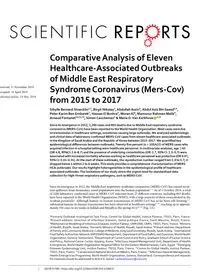
2019 Comparative Analysis of Eleven Healthcare-Associated Outbreaks of Middle East Respiratory Syndrome Coronavirus (Mer PDF
Preview 2019 Comparative Analysis of Eleven Healthcare-Associated Outbreaks of Middle East Respiratory Syndrome Coronavirus (Mer
1 Scientific RepoRts | (2019) 9:7385 | https://doi.org/10.1038/s41598-019-43586-9 www.nature.com/scientificreports Comparative Analysis of eleven Healthcare-Associated outbreaks of Middle east Respiratory syndrome Coronavirus (Mers-Cov) from 2015 to 2017 sibylle Bernard-stoecklin1,2, Birgit Nikolay3, Abdullah Assiri4, Abdul Aziz Bin saeed5,6, peter Karim Ben embarek7, Hassan el Bushra5, Moran Ki8, Mamunur Rahman Malik9, Arnaud Fontanet10,11,12, Simon Cauchemez3 & Maria D. Van Kerkhove 1,13 Since its emergence in 2012, 2,260 cases and 803 deaths due to Middle East respiratory syndrome coronavirus (MERS-CoV) have been reported to the World Health Organization. Most cases were due to transmission in healthcare settings, sometimes causing large outbreaks. We analyzed epidemiologic and clinical data of laboratory-confirmed MERS-CoV cases from eleven healthcare-associated outbreaks in the Kingdom of Saudi Arabia and the Republic of Korea between 2015–2017. We quantified key epidemiological differences between outbreaks. Twenty-five percent (n = 105/422) of MERS cases who acquired infection in a hospital setting were healthcare personnel. In multivariate analyses, age ≥65 (OR 4.8, 95%CI: 2.6–8.7) and the presence of underlying comorbidities (OR: 2.7, 95% CI: 1.3–5.7) were associated with increased mortality whereas working as healthcare personnel was protective (OR 0.07, 95% CI: 0.01–0.34). At the start of these outbreaks, the reproduction number ranged from 1.0 to 5.7; it dropped below 1 within 2 to 6 weeks. This study provides a comprehensive characterization of MERS HCA-outbreaks. Our results highlight heterogeneities in the epidemiological profile of healthcare- associated outbreaks. The limitations of our study stress the urgent need for standardized data collection for high-threat respiratory pathogens, such as MERS-CoV. Since its emergence in 2012, the Middle East respiratory syndrome coronavirus (MERS-CoV) has caused recur- rent spillovers from dromedary camel populations into the human population1–3. As of 1 October 2018, a total of 2260 laboratory-confirmed cases of MERS-CoV infection from 27 different countries, including 803 deaths, have been reported to the World Health Organization (WHO), with a large majority of them concentrated in the Arabian peninsula4. Although human-to-human transmission of MERS-CoV has so far been self-limiting5–7, substantial human-to-human transmission has been observed in healthcare settings8–19, reaching up to approxi- mately 550 cases in six weeks in Jeddah and Riyadh in the spring 201420–22 (Fig. 1A). 1Formerly Outbreak Investigation Task Force, Centre for Global Health, Institut Pasteur, 75015, Paris, France. 2Present address: Direction of infectious diseases, Santé publique France, Saint-Maurice, 94410, France. 3Mathematical Modelling of Infectious Diseases, Institut Pasteur, UMR2000, CNRS, 75015, Paris, France. 4Ministry of Health, Riyadh, Saudi Arabia. 5Formerly Ministry of Health, Riyadh, Saudi Arabia. 6Present address: Department of Family and Community Medicine, College of Medicine, King Saud University, Riyadh, Saudi Arabia. 7international Food Safety Authorities Network (INFOSAN) Management, Department of Food Safety and Zoonoses, World Health Organization, Geneva, Switzerland. 8Department of cancer control and Policy, Graduate School of cancer Science and Policy, National Cancer Center, Goyang, Korea. 9Infectious Hazard Management Unit, Department of Health Emergencies, World Health Organization Regional Office for the Eastern Mediterranean, Cairo, Egypt. 10emerging Diseases Epidemiology Unit, Institut Pasteur, 75015, Paris, France. 11centre for Global Health, institut Pasteur, 75015, Paris, France. 12Conservatoire National des Arts et Métiers, Paris, France. 13Infectious Hazards Management, Health Emergencies Programme, World Health Organization, Geneva, Switzerland. Correspondence and requests for materials should be addressed to M.D.V.K. (email:
